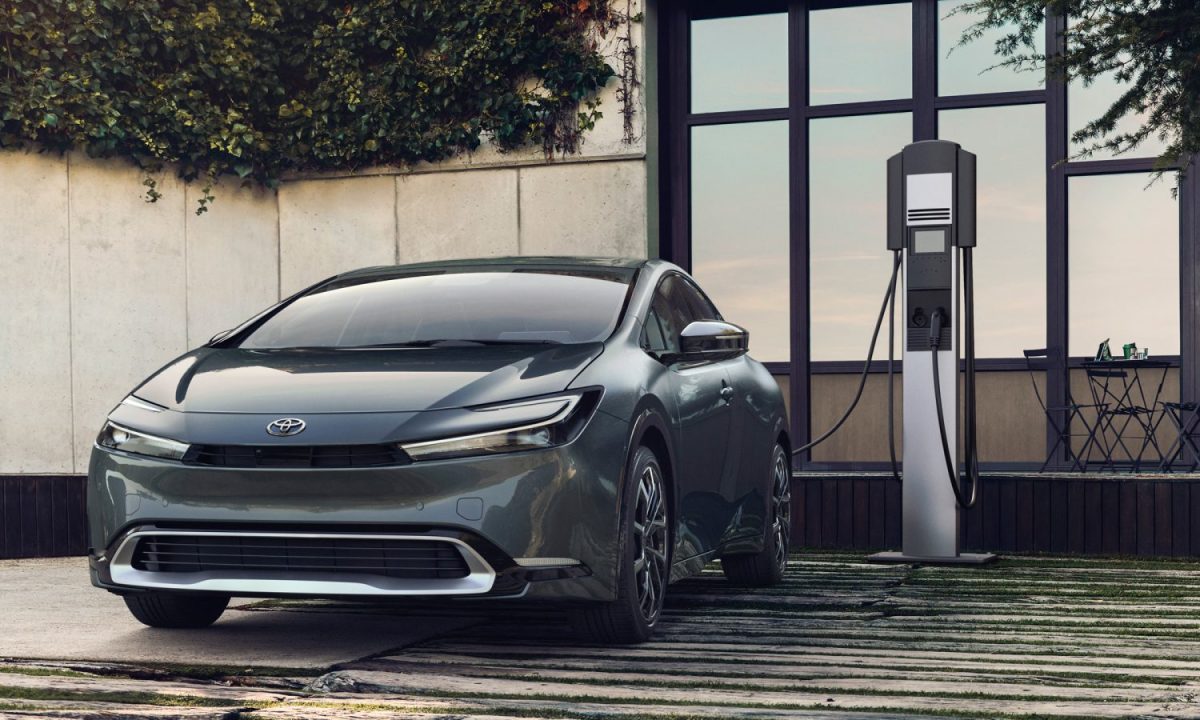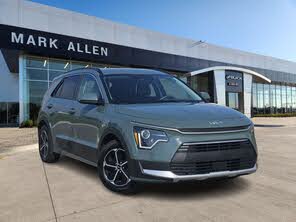Toyota Prius Prime vs Kia Niro Hybrid Plug-In
Overview | |
Years produced2017-2024 | Years produced2018-Present |
MSRP$28,220 | MSRP$33,840 |
Listings1131 | Listings417 |
Ratings & Reviews | |
User Reviews | User Reviews |
Expert reviews6.5 out of 10 | Expert reviews7.2 out of 10 |
Pros
Cons
| Pros
Cons
|
Reviews SummaryWith the 2021 Prius Prime, Toyota does what Toyota does best—packaging. The car comes with a good list of standard equipment and features while maintaining the range and efficiency qualities that plug-in hybrid shoppers are looking for. But a hard-to-use infotainment system and slow acceleration eat into the ownership experience as the market gets increasingly more competitive. | |
Reviews SummaryThe Kia Niro gets redesigned for 2023 model year, but keeps its trifecta of hybrid, plug-in hybrid, and all-electric powertrains. With the demise of its Hyundai Ioniq (not to be confused with the Ioniq 5) cousin, the Niro is now the only vehicle sold in the United States with those three powertrain options, ranging from a traditional hybrid to a fully electric vehicle. The second-generation 2023 Kia Niro PHEV plug-in hybrid gets the same updates as its Kia Niro Hybrid and Niro EV siblings (which we’ll cover in separate reviews), including dramatic new styling and a revamped interior, plus more power and electric range than the previous-generation Niro PHEV, which dated back to the 2018 model year. The plug-in hybrid market has shifted a bit since that first-generation Niro PHEV was launched. That version was considered significant because it wasn’t derived from a non-electrified model, but that no longer seems to be a priority for automakers or customers. Aside from the Toyota Prius Prime, most mainstream plug-in hybrids are now variants of existing crossovers, such as the Ford Escape PHEV, Hyundai Tucson Plug-In Hybrid, Mitsubishi Outlander Plug-In Hybrid, and Toyota RAV4 Prime—as well as Kia’s own Sportage PHEV. So the question for the 2023 Niro PHEV is, with plug-in hybrid versions of familiar crossover models now available, does a dedicated design still matter? | |
No video found | |
Popular Features & Specs | |
Engine1.8L 121 hp I4 Hybrid | Engine1.6L 180 hp I4 Hybrid |
Drive TrainFWD | Drive TrainFWD |
Seating Capacity5 | Seating Capacity5 |
Horsepower | Horsepower180 hp @ 5700 rpm |
EV Battery Capacity8.8 kWh | EV Battery Capacity11.1 kWh |
MPG City145 | MPG City113 |
MPG Highway121 | MPG Highway102 |
Battery Charge Time (120V)5.5 hours | Battery Charge Time (120V)8.75 hours |
Battery Charge Time (240V)2 hours | Battery Charge Time (240V)2.25 hours |
Engine | |
Engine Name1.8L 121 hp I4 Hybrid | Engine Name1.6L 180 hp I4 Hybrid |
Torque | Torque195 lb-ft @ 4000 rpm |
Horsepower | Horsepower180 hp @ 5700 rpm |
Battery Charge Time (120V)5.5 hours | Battery Charge Time (120V)8.75 hours |
Battery Charge Time (240V)2 hours | Battery Charge Time (240V)2.25 hours |
DrivetrainFWD | DrivetrainFWD |
Fuel Economy | |
EV Battery Capacity8.8 kWh | EV Battery Capacity11.1 kWh |
MPG City145 | MPG City113 |
MPG Highway121 | MPG Highway102 |
Interior | |
Seating Capacity5 | Seating Capacity5 |
Key Features | |
Navigation System | Navigation SystemStandard |
Safety | |
Front Crash Overall4 | Front Crash Overall |
Side Crash Overall5 | Side Crash Overall |
Dimensions & Capacity | |
Cargo Space19.8 cu ft | Cargo Space19.4 cu ft |
Curb Weight3365 lbs | Curb Weight3336 lbs |
Height57.9 in | Height60.8 in |
Length182.9 in | Length174.0 in |
Width69.3 in | Width71.8 in |
Wheelbase106.3 in | Wheelbase107.1 in |
Maximum Payload840 lbs | Maximum Payload1161 lbs |
Number of doors4 | Number of doors4 |
Overview | ||
Years produced | 2017-2024 | 2018-Present |
MSRP | $28,220 | $33,840 |
Listings | ||
Ratings & Reviews | ||
User reviews | ||
Expert reviews | 6.5 out of 10Read full review | 7.2 out of 10Read full review |
Pros & cons | Pros
Cons
| Pros
Cons
|
Summary | With the 2021 Prius Prime, Toyota does what Toyota does best—packaging. The car comes with a good list of standard equipment and features while maintaining the range and efficiency qualities that plug-in hybrid shoppers are looking for. But a hard-to-use infotainment system and slow acceleration eat into the ownership experience as the market gets increasingly more competitive. | The Kia Niro gets redesigned for 2023 model year, but keeps its trifecta of hybrid, plug-in hybrid, and all-electric powertrains. With the demise of its Hyundai Ioniq (not to be confused with the Ioniq 5) cousin, the Niro is now the only vehicle sold in the United States with those three powertrain options, ranging from a traditional hybrid to a fully electric vehicle. The second-generation 2023 Kia Niro PHEV plug-in hybrid gets the same updates as its Kia Niro Hybrid and Niro EV siblings (which we’ll cover in separate reviews), including dramatic new styling and a revamped interior, plus more power and electric range than the previous-generation Niro PHEV, which dated back to the 2018 model year. The plug-in hybrid market has shifted a bit since that first-generation Niro PHEV was launched. That version was considered significant because it wasn’t derived from a non-electrified model, but that no longer seems to be a priority for automakers or customers. Aside from the Toyota Prius Prime, most mainstream plug-in hybrids are now variants of existing crossovers, such as the Ford Escape PHEV, Hyundai Tucson Plug-In Hybrid, Mitsubishi Outlander Plug-In Hybrid, and Toyota RAV4 Prime—as well as Kia’s own Sportage PHEV. So the question for the 2023 Niro PHEV is, with plug-in hybrid versions of familiar crossover models now available, does a dedicated design still matter? |
Video | No video found | |
Popular Features & Specs | ||
Engine | 1.8L 121 hp I4 Hybrid | 1.6L 180 hp I4 Hybrid |
Drive Train | FWD | FWD |
Seating Capacity | 5 | 5 |
Horsepower | 180 hp @ 5700 rpm | |
EV Battery Capacity | 8.8 kWh | 11.1 kWh |
MPG City | 145 | 113 |
MPG Highway | 121 | 102 |
Battery Charge Time (120V) | 5.5 hours | 8.75 hours |
Battery Charge Time (240V) | 2 hours | 2.25 hours |
Engine | ||
Engine Name | 1.8L 121 hp I4 Hybrid | 1.6L 180 hp I4 Hybrid |
Torque | 195 lb-ft @ 4000 rpm | |
Horsepower | 180 hp @ 5700 rpm | |
Battery Charge Time (120V) | 5.5 hours | 8.75 hours |
Battery Charge Time (240V) | 2 hours | 2.25 hours |
Drivetrain | FWD | FWD |
Fuel Economy | ||
EV Battery Capacity | 8.8 kWh | 11.1 kWh |
MPG City | 145 | 113 |
MPG Highway | 121 | 102 |
Interior | ||
Seating Capacity | 5 | 5 |
Key Features | ||
Navigation System | Standard | |
Safety | ||
Front Crash Overall | 4 | |
Side Crash Overall | 5 | |
Dimensions & Capacity | ||
Cargo Space | 19.8 cu ft | 19.4 cu ft |
Curb Weight | 3365 lbs | 3336 lbs |
Height | 57.9 in | 60.8 in |
Length | 182.9 in | 174.0 in |
Width | 69.3 in | 71.8 in |
Wheelbase | 106.3 in | 107.1 in |
Maximum Payload | 840 lbs | 1161 lbs |
Number of doors | 4 | 4 |

By: CarGurus + AI
At CarGurus, our team of experienced automotive writers remain at the heart of our content operation, conducting hands-on car tests and writing insightful guides that are backed by years of industry experience. To complement this, we are harnessing AI to make our content offering more diverse and more helpful to shoppers than ever. To achieve this, our AI systems are based exclusively on CarGurus content, ratings and data, so that what we produce is both unique to CarGurus, and uniquely helpful to car shoppers.









































